Key takeaways:
- Failed trades highlight the importance of emotional detachment and strong risk management in trading.
- Learning from mistakes and analyzing trading decisions can improve future strategies and outcomes.
- Key reasons for trade failures include poor risk management, emotional decision-making, and inadequate research.
- Utilizing a trading journal and staying informed about market trends can significantly enhance trading success.
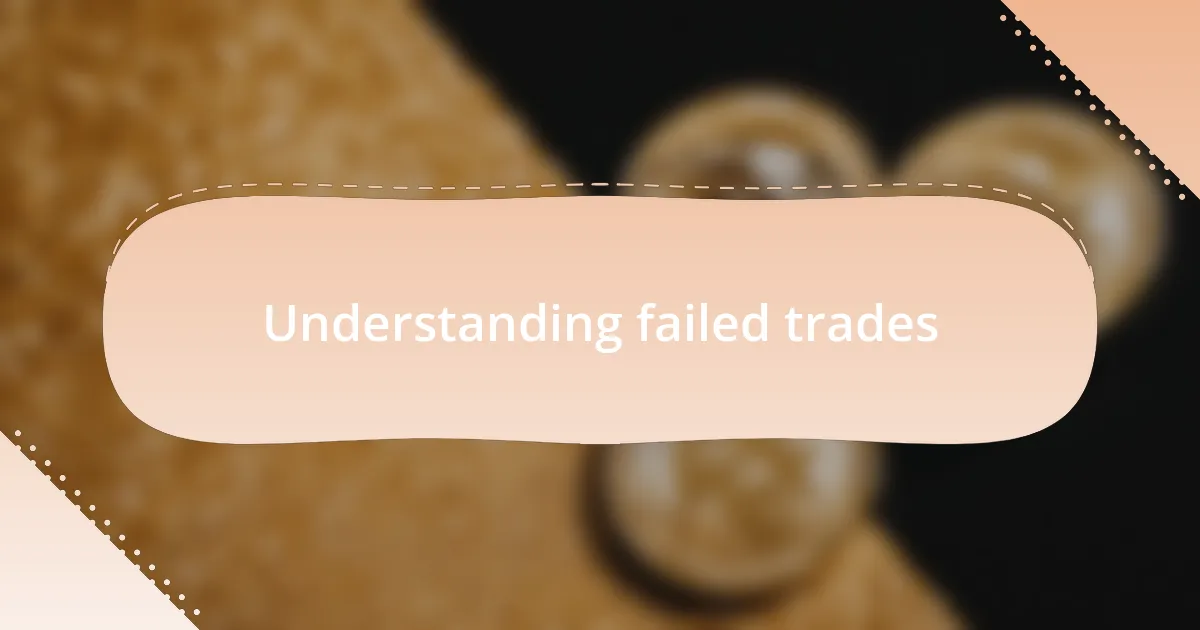
Understanding failed trades
Understanding failed trades is a crucial aspect of a trader’s journey in the cryptocurrency space. I remember my first failed trade vividly; I was so confident I was going to make a profit that I didn’t consider anything outside my analysis. That feeling of disbelief when I saw my investment plummet was eye-opening; it made me realize how important it is to remain detached and analytical rather than emotionally driven.
Failed trades are often a painful reminder of the volatility inherent in cryptocurrencies. There was a time when I ignored clear market signals simply because I was too invested in my original thesis. How many times have you found yourself clinging to a losing position, hoping against hope it would turn around? It’s a tough realization; I learned that it’s vital to be willing to cut losses to protect my portfolio.
Understanding the reasons behind these failures often clarifies future decision-making. After one particularly disappointing trade, I took a hard look at my strategy and identified gaps in my risk management plan. This process not only helped me to improve but also reshaped my entire approach to trading—an invaluable lesson that many overlook amidst the chaos of the crypto market.
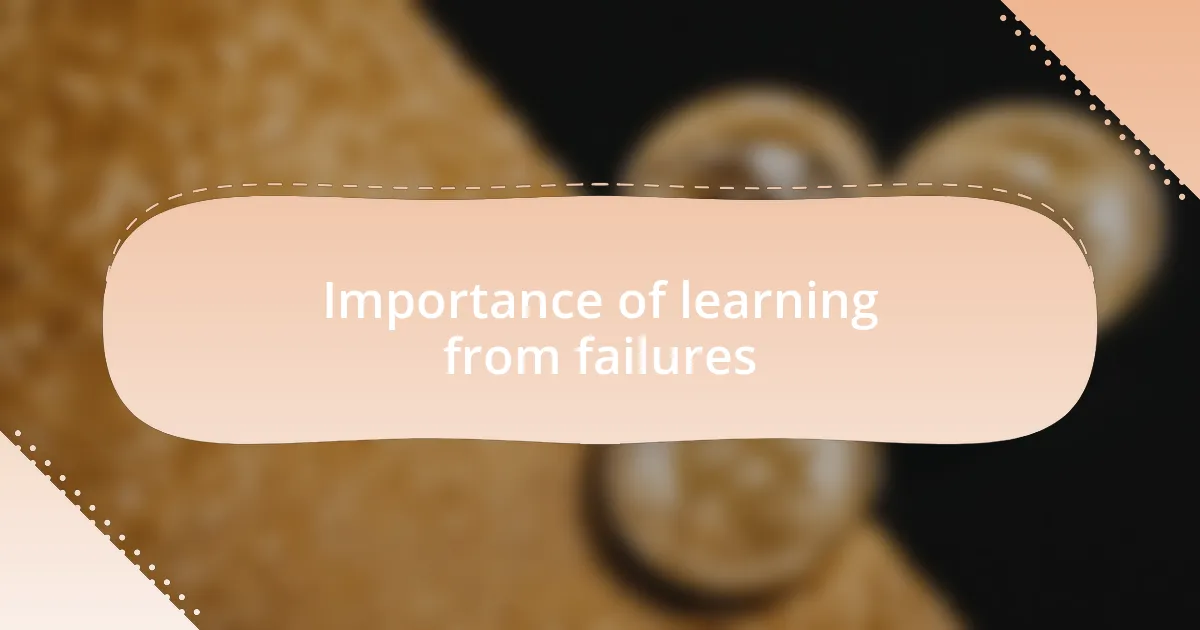
Importance of learning from failures
Learning from failures is essential for growth, especially in trading. Each setback I’ve experienced taught me invaluable lessons that shaped my trading strategy. Reflecting on a particularly challenging trade, I often wonder: what if I had embraced that loss instead of avoiding it? The insights I gained helped me develop a more resilient mindset.
Failures often serve as a mirror, reflecting our weaknesses and blind spots. I remember a time when I doubled down on a losing trade, thinking my luck would change. That moment was painful, yet it opened my eyes to the necessity of maintaining a balanced perspective and not letting emotions dictate my actions. It’s incredible how a single failed trade can pivot the entire direction of your trade philosophy.
Embracing failures allows us to refine our strategies continuously. The emotional weight of a bad trade can linger, but the lessons drawn from it linger even longer, offering guidance in future trades. In my experience, acknowledging my mistakes led me to a deeper understanding of market dynamics, compelling me to analyze not only the numbers but also my decision-making process. Would adopting such a reflective approach not enhance everyone’s trading journey?
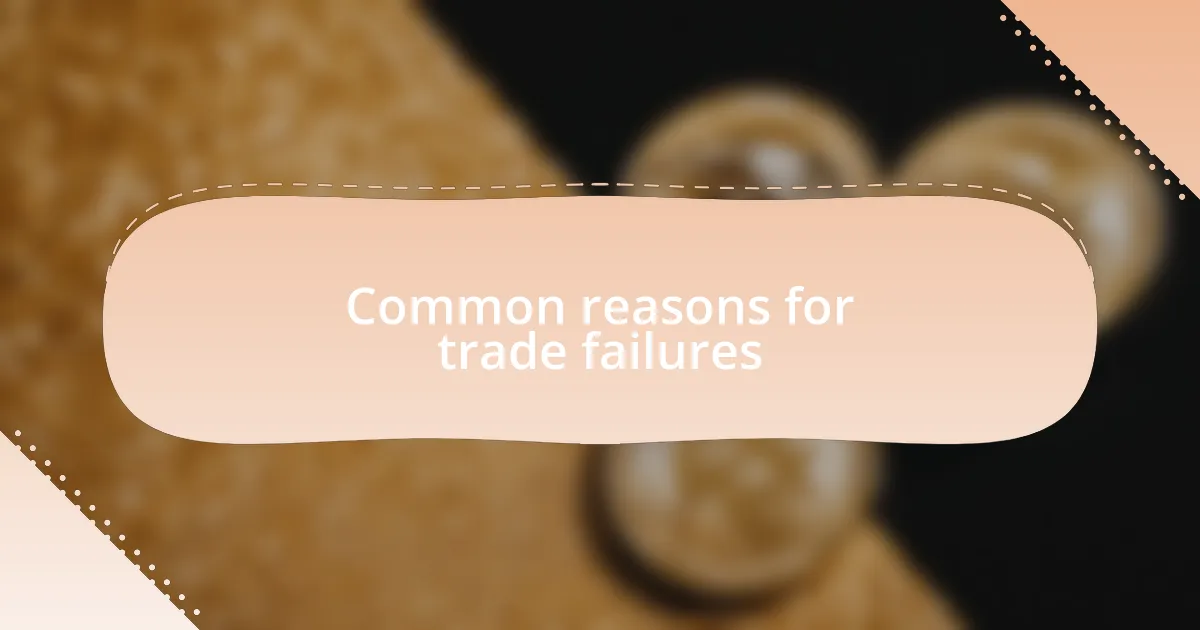
Common reasons for trade failures
One of the most common reasons for trade failures is poor risk management. I remember a time when I entered a trade without setting a stop-loss order. I thought the potential gains outweighed the risks. However, the market moved against me, and I faced a significant loss. This experience taught me that even the best analysis can’t predict market volatility, and having a safety net is crucial.
Another frequent cause of failed trades is emotional decision-making. There have been moments when I let fear or greed dictate my strategies. For instance, after a losing streak, I once chased a trending coin out of desperation, only to see it crash moments later. It struck me then how easy it is to fall into the trap of trying to recover losses quickly, often leading to worse outcomes. How many times have we all succumbed to that urge, thinking it’s our ticket back to profit?
Lastly, lack of adequate research often leads to unfortunate trading decisions. I once invested in a cryptocurrency purely based on hype, without diving deep into the project’s fundamentals. The disappointment was palpable when the coin’s value plummeted. It dawned on me that informed decisions, backed by thorough research, can make all the difference. It’s tempting to follow popular trends, but doesn’t a solid foundation of knowledge provide a stronger edge in trading?
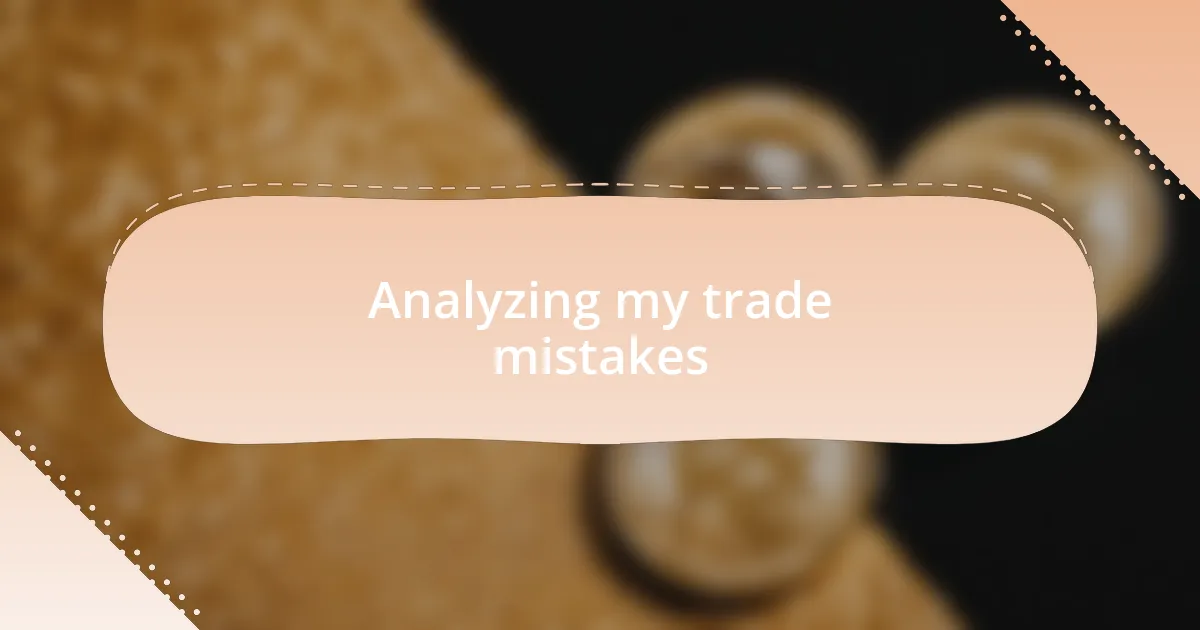
Analyzing my trade mistakes
Analyzing my trade mistakes has been a humbling experience, revealing patterns I hadn’t considered before. One instance that stands out happened when I entered a trade on instinct rather than analysis. I thought my intuition would guide me, but the results were disastrous. It made me realize how crucial it is to base decisions not just on gut feelings, but on sound strategies and thorough research.
There was another time I became overly confident after a string of successful trades. I took on a position much larger than my usual size, fueled by my previous wins. The market shifted unexpectedly, and that overconfidence cost me dearly. It was a harsh lesson about the importance of humility in trading. How often do we underestimate the market’s unpredictability when we think we have it all figured out?
Looking back, I recognize that most of my trading mistakes stemmed from ignoring my trading journal. I had a habit of making trades and not documenting my thought process or emotions during each one. It took quite some time to realize how missing that reflection limited my growth. How can we evolve as traders without learning from our past, right? Tracking decisions and outcomes in some structured way could have shown me clear patterns and areas for improvement much sooner.
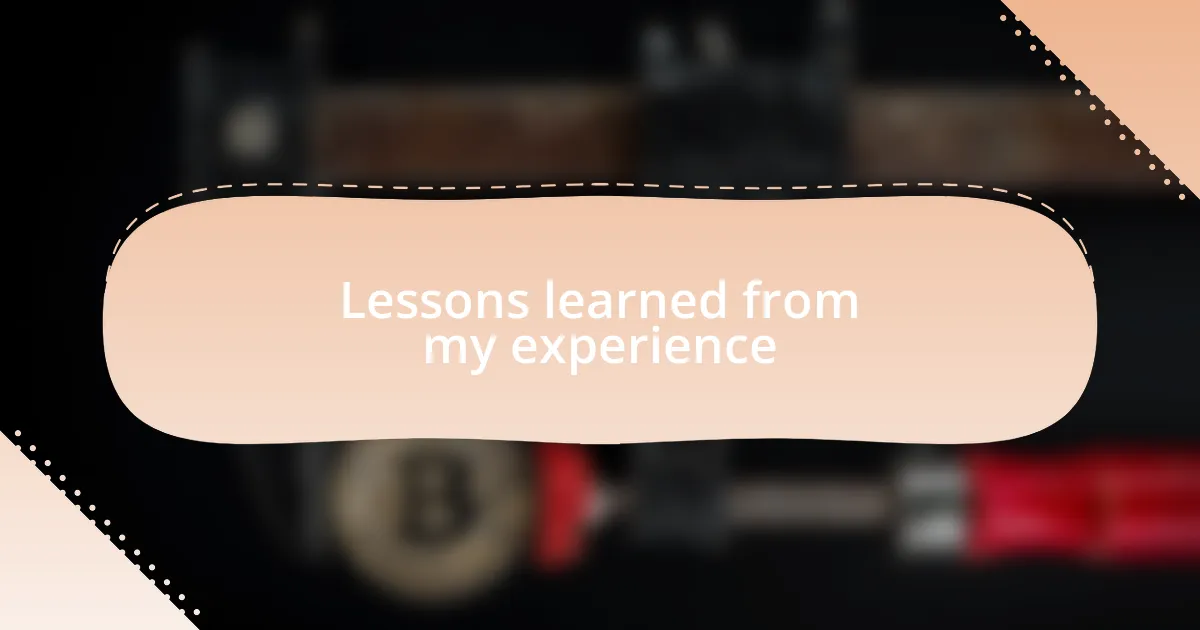
Lessons learned from my experience
I learned that emotions play a significant role in trading, often clouding judgment. There was a moment when I held onto a losing position, convinced that it would rebound any day. Those sleepless nights spent worrying about that investment made me realize that sometimes it’s better to cut losses and move on rather than cling to false hope. Have you ever found yourself in a similar situation, fearing the finality of a loss?
Another crucial lesson came from diversifying my portfolio too late. After a major loss due to concentrating on a single coin, I felt the sting of regret. It taught me that a balanced approach is vital. Relying on one or two assets simply isn’t smart. How can we expect consistent returns when we put all our eggs in one basket, especially in such a volatile market?
Finally, I discovered that timing is everything. There was a trade I executed in a panic, without waiting for the right entry point. I hoped to make a quick profit, but instead, I was met with swift losses. This experience led me to adopt a more patient mindset. Why rush decisions when the market is filled with opportunities? Waiting for the right moment can make all the difference, as I’ve come to appreciate.
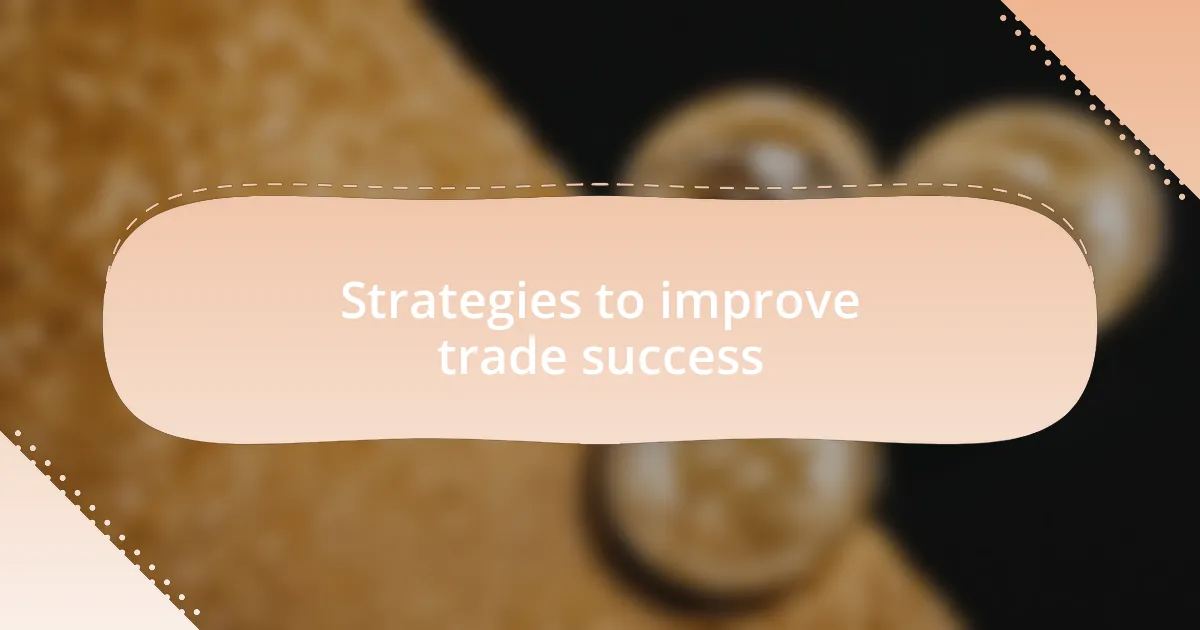
Strategies to improve trade success
To enhance trading success, one strategy I found effective is setting clear entry and exit rules before executing any trade. In one instance, I impulsively entered a position without a plan, fueled by hype, and soon regretted it as I watched my account diminish. Establishing rules gives structure to the chaos of the market and helps prevent emotionally driven decisions. How often do we act quickly without thinking ahead?
Another approach is to stay informed and continuously educate yourself about the market. I remember a time when I underestimated the impact of regulatory news on prices, which ultimately cost me. By regularly reading news and analyzing market trends, I’ve learned to anticipate changes and adjust my strategies accordingly. Are you keeping up with the factors that influence your investments?
Lastly, practicing disciplined risk management has transformed my trading experience. I used to risk too much on a single trade, driven by the allure of high rewards. This reckless behavior led to sleepless nights and regret. Ultimately, I learned to only risk a small percentage of my capital on each trade, which not only helps maintain my sanity but also protects my portfolio from significant losses. Have you established safeguards to protect your investments?

Moving forward with better practices
Moving forward, incorporating a trading journal has become a game changer for me. Reflecting on my past mistakes and successes has allowed me to recognize patterns in my decision-making. Have you ever chronicled your trading journeys? By documenting each trade and the emotions tied to it, I’ve gained valuable insights that inform my future strategies.
Embracing technology is another step I’ve taken to refine my approach. Utilizing tools like automated alerts and technical analysis software has helped me make more informed decisions and avoid rash moves. I remember when I missed out on a profitable trade simply because I wasn’t monitoring the charts closely enough. Are you leveraging the right tools to support your trading?
Additionally, fostering a community of fellow traders has proven invaluable. Engaging in discussions and sharing experiences with others who understand the market’s intricacies can provide fresh perspectives. I once found a mentor in a trading forum who guided me through my confusion during a downturn. Could collaboration with others be the key to elevating your trading game?